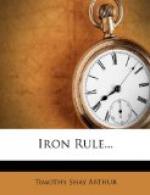For many minutes she sat thus. But the child slept on. Once or twice she tried to awake him, that he might get the supper she had brought; but he slept on soundly, and she refrained, unwilling to call him back to the grief of mind she felt that consciousness would restore. Undressing him, at length, she laid him in his bed, and bending over his precious form in the deeper darkness that had now fallen, lifted her heart, and prayed that God would keep him from evil. For a long time did she bend thus over her boy, and longer still would she have remained near him, for her heart was affected with an unusual tenderness, had not the cries of her younger child summoned her from the room.
CHAPTER II
The tears of childhood are soon dried. Grief is but as the summer rain. On the next morning, little Andrew’s voice was heard singing over the house, as merrily as ever. But the sound did not affect, pleasantly, the mind of his father. He had not forgotten the scene of the previous evening, and was far from having forgiven the disobedience he had punished so severely. Had Andrew come forth from his chamber silent and with a sober, abashed, and fearful countenance, as if he still bore the weight of his father’s displeasure, Mr. Howland would have felt that he had made some progress in the work of breaking the will of his child. But to see him moving about and singing as gaily as a bird, discouraged him.
“Have I made no impression on the boy?” he asked himself.
“Father!” said Andrew, running up, with a happy smile upon his face, as these thoughts were passing through the mind of Mr. Howland, “won’t you buy me a pretty book? Oh! I want one—”
“Naughty, disobedient boy!”
These were the words, uttered sternly, and with a forbidding aspect of countenance, that met this affectionate state of mind, and threw the child rudely from his father.
Andrew looked frightened for a moment or two, and then shrunk away. From that time until his father left the house, his voice was still. During the morning, he amused himself with his playthings and his little sister, and seemed well contented. But after dinner he became restless, and often exclaimed—
“Oh! I wish I had somebody to play with!”
At length, after sitting by the window and looking out for a long time, he turned to his mother, and said—
“Mother, can’t I go and see Emily Winters?”
“No, Andrew, of course not,” replied Mrs. Howland.
“Why, mother? I like her, and she’s good.”
“Because your father doesn’t wish you go to her house. Didn’t he punish you last evening for going there?”
At this the child grew impatient, and threw himself about with angry gestures. Then he sat down and cried for a time bitterly, while his mother strove, but in vain, to (sic) sooth him. For hours his thoughts had been on his little friend, and now he cared for nothing but to see her. Denied this privilege from mere arbitrary authority, his mind had become fretted beyond his weak ability to control himself.




